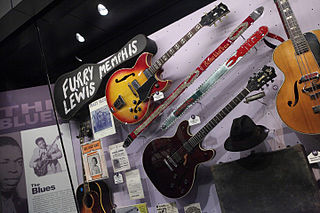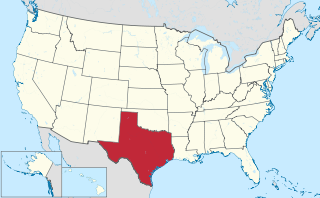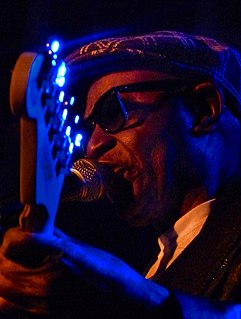
Blues is a music genre and musical form which was originated in the Deep South of the United States around the 1870s by African-Americans from roots in African musical traditions, African-American work songs, and spirituals. Blues incorporated spirituals, work songs, field hollers, shouts, chants, and rhymed simple narrative ballads. The blues form, ubiquitous in jazz, rhythm and blues and rock and roll, is characterized by the call-and-response pattern, the blues scale and specific chord progressions, of which the twelve-bar blues is the most common. Blue notes, usually thirds, fifths or sevenths flattened in pitch are also an essential part of the sound. Blues shuffles or walking bass reinforce the trance-like rhythm and form a repetitive effect known as the groove.
Country is a genre of popular music that takes its roots from genres such as blues and old-time music, and various types of American folk music including Appalachian, Cajun, and the cowboy Western music styles of Red Dirt, New Mexico, Texas country, and Tejano. Its popularized roots originate in the Southern United States of the early 1920s.
Country rock is a subgenre of popular music, formed from the fusion of rock and country. It was developed by rock musicians who began to record country-flavored records in the late 1960s and early 1970s. These musicians recorded rock records using country themes, vocal styles, and additional instrumentation, most characteristically pedal steel guitars. Country rock began with artists like Bob Dylan, the Byrds, Buffalo Springfield, Nitty Gritty Dirt Band, the Flying Burrito Brothers, The International Submarine Band and others, reaching its greatest popularity in the 1970s with artists such as Emmylou Harris, the Eagles, Linda Ronstadt, Michael Nesmith, Poco and Pure Prairie League. Country rock also influenced artists in other genres, including the Band, the Grateful Dead, Creedence Clearwater Revival, the Rolling Stones, and George Harrison's solo work, as well as playing a part in the development of Southern rock.

A honky-tonk is both a bar that provides country music for the entertainment of its patrons and the style of music played in such establishments. Bars of this kind are common in the South and Southwest United States. Many eminent country music artists, such as Jimmie Rodgers, Loretta Lynn, Patsy Cline, Ernest Tubb, Johnny Horton and Merle Haggard, began their careers as amateur musicians in honky-tonks. The modern-day honky-tonk atmosphere has continued with the likes of Dwight Yoakam, Turnpike Troubadours, and Mike and the Moonpies.
Electric blues refers to any type of blues music distinguished by the use of electric amplification for musical instruments. The guitar was the first instrument to be popularly amplified and used by early pioneers T-Bone Walker in the late 1930s and John Lee Hooker and Muddy Waters in the 1940s. Their styles developed into West Coast blues, Detroit blues, and post-World War II Chicago blues, which differed from earlier, predominantly acoustic-style blues. By the early 1950s, Little Walter was a featured soloist on blues harmonica using a small hand-held microphone fed into a guitar amplifier. Although it took a little longer, the electric bass guitar gradually replaced the stand-up bass by the early 1960s. Electric organs and especially keyboards later became widely used in electric blues.
Cowpunk is a subgenre of punk rock that began in the United Kingdom in the late 1970s and southern California in the early 1980s. It combines punk rock or new wave with country, folk, and blues in its sound, lyrical subject matter, attitude, and style. Examples include The Long Ryders, Dash Rip Rock, Violent Femmes, the Blasters, Mojo Nixon, Meat Puppets, The Beat Farmers, Rubber Rodeo, Rank and File, and Jason and the Scorchers. Many of the musicians in this scene subsequently became associated with alternative country, roots rock or Americana. In the 2000s (decade), Those Darlins have been called a cowpunk band.
The music of Louisiana can be divided into three general regions: rural south Louisiana, home to Creole Zydeco and Old French, New Orleans, and north Louisiana. The region in and around Greater New Orleans has a unique musical heritage tied to Dixieland jazz, blues, and Afro-Caribbean rhythms. The music of the northern portion of the state starting at Baton Rouge and reaching Shreveport has similarities to that of the rest of the US South.
The term American folk music encompasses numerous music genres, variously known as traditional music, traditional folk music, contemporary folk music, or roots music. Many traditional songs have been sung within the same family or folk group for generations, and sometimes trace back to such origins as Great Britain, Europe, or Africa. Musician Mike Seeger once famously commented that the definition of American folk music is "...all the music that fits between the cracks."

The U.S. state of Texas has long been a center for musical innovation and is the birthplace of many notable musicians. Texans have pioneered developments in Tejano and Conjunto music, Rock 'n Roll, Western swing, jazz, punk rock, country, hip-hop, electronic music, gothic industrial music, religious music, mariachi, psychedelic rock, zydeco and the blues.

Outlaw country is a subgenre of American country music, most popular during the 1970s and early 1980s, sometimes referred to as the outlaw movement or simply outlaw music. The music has its roots in earlier subgenres like honky tonk and rockabilly and is characterized by a blend of rock and folk rhythms, country instrumentation and introspective lyrics. The movement began as a reaction to the slick production and popular structures of the Nashville sound developed by record producers like Chet Atkins.
Roots rock is rock music that looks back to rock's origins in folk, blues and country music. It is particularly associated with the creation of hybrid subgenres from the later 1960s including blues rock, country rock and southern rock, swamp rock which have been seen as responses to the perceived excesses of dominant psychedelic and developing progressive rock. Because roots music (Americana) is often used to mean folk and world musical forms, roots rock is sometimes used in a broad sense to describe any rock music that incorporates elements of this music. In the 1980s, roots rock enjoyed a revival in response to trends in punk rock, new wave and heavy metal music.
Swamp pop is a music genre indigenous to the Acadiana region of south Louisiana and an adjoining section of Southeast Texas. Created in the 1950s and early 1960s by teenage Cajuns, it combines New Orleans-style rhythm and blues, country and western, and traditional French Louisiana musical influences. Although a fairly obscure genre, swamp pop maintains a large audience in its south Louisiana and southeast Texas homeland, and it has acquired a small but passionate cult following in the United Kingdom, northern Europe, and Japan.
Texas blues is blues music from Texas. As a regional style, its original form was characterized by jazz and swing influences. Later examples are often closer to blues rock and Southern rock.
Aubrey Wilson Mullican, known professionally as Moon Mullican and nicknamed "King of the Hillbilly Piano Players", was an American country and western singer, songwriter, and pianist. He was associated with the hillbilly boogie style which greatly influenced rockabilly. Jerry Lee Lewis cited him as a major influence on his own singing and piano playing.
Red Dirt is a music genre that gets its name from the color of soil found in Oklahoma. Stillwater, Oklahoma is considered to be the center of red dirt music ; but the genre also extends to music made south of the Red River in Texas. Outlaw country legends Waylon Jennings and Willie Nelson have been associated with the distinctive Texas Sound, while the late Oklahoma singer-songwriter Bob Childers is widely recognized as the Father of Oklahoma Red Dirt music. At one time, the distinction between the two genres was sonically obvious, but by 2008, that gap had diminished.
Texas Country Music is a rapidly growing subgenre of country music from Texas. Texas country is a unique style of Western music and is often associated with other distinct neighboring styles, including Red Dirt from Oklahoma, the New Mexico music of New Mexico, and Tejano in West Texas. All of which have influenced one another over the years, and are popular throughout Texas, the Midwest, the Southwest, and other parts of the Western United States. Texas Country is known for fusing neotraditional country with the outspoken, care-free views of outlaw country. Texas Country blends these sub-genres with a "common working man" theme and witty undertones, these often combine with a stripped down music sound.

The culture of Texas is to a large extent both defining and defined by the greater American culture. Texas is both one of the most populous and populated American states in its urban centers, and has seen tremendous waves of migration out of the American North and West in contrast to its eastern neighbors in the Deep South. But it retains the regionalisms and distinct cultural identities of Tejanos, Cajuns, Irish, African American, and Anglo American enclaves established prior to the republic era and admission to statehood.
This article includes an overview of the major events and trends in popular music in the 1950s.

Bnois King is a Texas Blues and Jazz guitar player, vocalist, and composer. He most often played guitar and rhythm guitar, and acted as the main vocalist and original song writer for the Smokin' Joe Kubek Band, touring and equally billed with Kubek after 1997.





